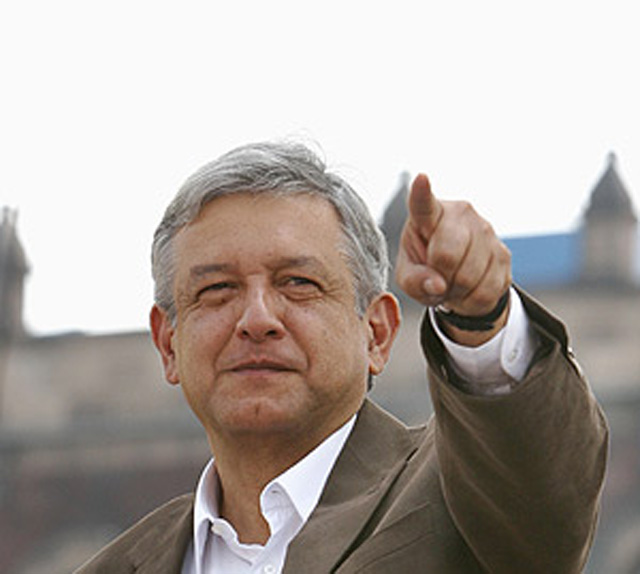Some people learn Spanish by memorizing verb conjugations and vocabulary lists. Others – the more fortunate among us – seem to just soak it in through books, movies and songs. Still others go the language-exchange route, honing their Spanish chops with a conversation partner in what often turn out to be transparent preludes to a pickup attempt.
Me? I learned my Spanish from AMLO.
AMLO is Andres Manuel López Obrador, a Mexican politician, former mayor of Mexico City, two-time Presidential candidate and two-time victim of electoral fraude. This post isn’t about his politics, though, but about his language. You see, unlike the technocratic, triangulating, telepromptered, say-nothing-but-say-it-pretty crowd of formless fluffballs that have come to occupy our television screens like scarecrows in a fallow field, AMLO has a way with words that years of media feeding frenzies have been unable to hammer out of him. He’s from the coastal state of Tabasco, you see, where saucy speech comes with the territory. All of which makes him, hands down, the best Spanish teacher I’ve ever had.

It was AMLO, for example, who taught me that a good for nothing is a mequetrefe. A mequetrefe who steals an election is an espurio (yes, the word “spurious” also exists in English, but without anywhere near the same edge to it). But the real power behind the throne is the mafia de poder, the power mafia, making the espurio nothing more than a pelele, a rag doll. And when the power mafia and their allies amongst the delincuentes de cuello blanco (white-collar delincuents) put on their little ceremonies like the Grito de la Independencia as if the espurio were actually legítimo, such spectacles are nothing more than faramallas, empty shows, or rather, numeritos – “little numbers”.
As you can imagine, AMLO’s plain-speaking ways have at times gotten him into trouble, as when, during the 2006 presidential campaign, he referred to then-president Vicente Fox as a chachalaca, apparently a rather noisy little bird and the rough equivalent of a chatterbox. Pretty mild stuff from an extranjero‘s point of view, but in Mexico, where the figure of the president has been historically sacrosanct, it amounted to high insult.

Undeterred, AMLO has continued to tour the country, calling a spade a spade. Legislators – or anyone – who need to show some backbone need to fajarse los pantalones, or tighten up their pants. In order to keep an adversary under close watch, AMLO recommends that you traerlo a mecate corto, or keep them on a short rope. In the fight against drug trafficking, one must be intelligent in order giving un garrotazo a lo tonto al avispero, or stupidly whacking the hornet’s nest. President Peña Nieto, who has a penchant for skipping the country when things get hot, is a candil de la calle y oscuridad de la casa, or, roughly, the “lamp in the street and the darkness at home”. In a neat example of a culinary metaphor, the unconditional support Peña – who is famed for having very little between the ears – received from the television station Televisa during the campaign of 2012 was a case of inflar a un merengue, or inflating a meringue.
And, of course, all the spicy language that is to come as AMLO gears up to run for president again in 2018. A feliz navidad to all, and happy Spanish learning!

